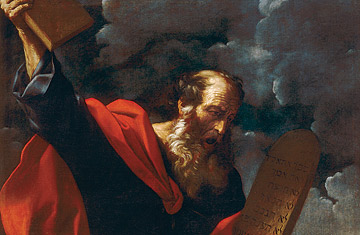
The Ten Commandments teach that freedom depends on law.
(2 of 3)
Americans faced a similar moment of chaos after the Revolution. One Connecticut preacher noted that Moses took 40 years to quell the Israelites' grumbling: Now "we are acting the same stupid part." And so just as a reluctant Moses led the Israelites out of Egypt, then handed down the Ten Commandments, a reluctant George Washington led the colonists to victory, then presided over the drafting of the Constitution. The parallel was not lost. Two-thirds of the eulogies at Washington's death compared the "leader and father of the American nation" to the "first conductor of the Jewish nation."
Let My People Go
While Moses was a unifying presence during the founding era, a generation later he got dragged into the issue that most divided the country. The Israelites' escape from slavery was the dominant motif of slave spirituals, including "Turn Back Pharaoh's Army," "I Am Bound for the Promised Land" and the most famous, "Go Down, Moses," which was called the national anthem of slaves: "When Israel was in Egypt Land,/ Let my people go;/ Oppressed so hard they could not stand,/ Let my people go."
Spirituals sent coded messages. As Frederick Douglass wrote, when he and his comrades sang, "O Canaan, sweet Canaan,/ I am bound for the land of Canaan," overseers believed they were worshipping the white god. But to them, it meant they were about to escape on the Underground Railroad. The movement's famous conductor, Harriet Tubman, was called the Moses of her people.
And yet even as abolitionists used the Exodus to attack slavery, Southerners used it to defend the institution. The War Between the States became the War Between the Moseses. Slaveholders cited a bevy of biblical passages — Abraham acquires slaves; Moses invites slaves to the first Passover; Jesus does nothing to free slaves — to claim the Bible endorsed slavery. The book that joined Americans together was torn asunder by slavery.
It took America's most Bible-quoting President to reunite the country. Called a pharaoh by his opponents, Abraham Lincoln freed the slaves after a "vow before God"; he invoked the Exodus at Gettysburg. When he died, Lincoln, like Washington before him, was compared to Moses. "There is no historic figure more noble than that of the Jewish lawgiver," Henry Ward Beecher eulogized. "There is scarcely another event in history more touching than his death." Until now. "Again a great leader of the people has passed through toil, sorrow, battle and war, and come near to the promised land of peace, into which he might not pass over."
Lincoln's assassination initiated an even more long-lasting tribute to Moses, the Statue of Liberty, given to America by the French to honor the slain President. The sculptor, Frédéric Bartholdi, chose the goddess of liberty as his model, but he enhanced her with two icons from Moses: the nimbus of light around her head and the tablet in her arms, both from the moment Moses descends Mount Sinai with the Ten Commandments. The message: Freedom comes with law.
Moses and Superman
With the rise of secularism and the declining influence of the Bible in the 20th century, Moses might have melted away as a role model. But something curious happened. He was so identified as a hero of the American Dream that he superseded Scripture and entered the realm of popular culture, from novels to television.
Superman was modeled partly on Moses. The comic-book hero's creators, two bookish Jews from Cleveland named Jerry Siegel and Joe Shuster, drew their character's backstory from the superhero of the Torah. Just as baby Moses is floated down the Nile in a basket to escape annihilation, baby Superman is launched into space in a rocket ship to avoid extinction. Just as Moses is raised in an alien world before being summoned to liberate Israel, Superman is raised in an alien environment before being called to assist humanity.
